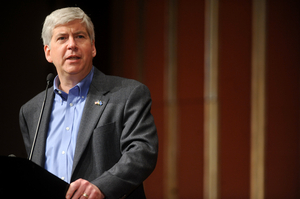This story has been updated
Gov. Rick Snyder signed teacher tenure reform into law Tuesday, the final step for some of the most sweeping changes made to Michigan’s education system in decades.
Now, the work will begin to implement the changes called for in the new package of four laws.
The laws end the practice of school districts making staffing decisions based on seniority, with classroom effectiveness now being a main consideration for administrators when making staffing decisions.
The laws also extend the period it takes to receive tenure from 4 to 5 years, with teachers able to be dismissed at any time during the probationary period.

Gov. Rick Snyder
“Making staffing decisions based on merit and performance encourages good teachers to keep doing what they are doing and helps ensure students receive the highest quality education,” Snyder said in a statement, adding that the reform will help keep enthusiastic, quality teachers in the classroom.
The reforms also require teachers to continue earning effective ratings in order to keep tenure, and school districts will have to notify parents in writing if their child is taught by a teacher who is rated ineffective.
Snyder also signed legislation into law that will make it easier for school districts to share resources by allowing superintendents of intermediate school districts to also serve as the superintendents of a local school district.
Questions still surround the legislation, with many school officials waiting for clarification on the changes. Many have wondered how the state will judge teachers to be effective, with “student growth” as the only parameter set forth so far.
John Austin, president of the Michigan State Board of Education, said the tenure reforms signed by Snyder Tuesday were among the recommendations the school board made to the governor in Feburary. He said the next step will be for a commission appointed by Snyder to determine the answers to the questions that still surround the legislation.
"Going forward, the key effort will be to make sure the teacher evaluation system that the law calls for ... will be fair, objective and based on the right measures," Austin said. "The state board of education will be weighing in on that."
The laws have been hotly debated among education advocates throughout the state since Snyder laid out his plans for teacher tenure reform in his education address in April.
Proponents of the legislation say the reforms will allow teachers who are consistently ineffective to be weeded out of the state’s classrooms in favor of more quality teachers.
However, critics such as Ann Arbor Education Association President Brit Satchwell, believe the reforms reflect an attempt by state lawmakers to industrialize education.
Teacher tenure reform stories
Here are a few stories chronicling the tenure reform process:
Satchwell said earlier this month that the reforms represent state lawmakers heading in the wrong direction regarding education. His term for the end goal of lawmakers was “Teachertrons.”
“They’re taking an inspired profession and take all the inspiration and heart out of it,” he said. “We’ll end up with a bunch of factory workers and that’s what the people at the top want.”
Kyle Feldscher covers K-12 education for AnnArbor.com. He can be reached atkylefeldscher@annarbor.com or you can follow him on Twitter.